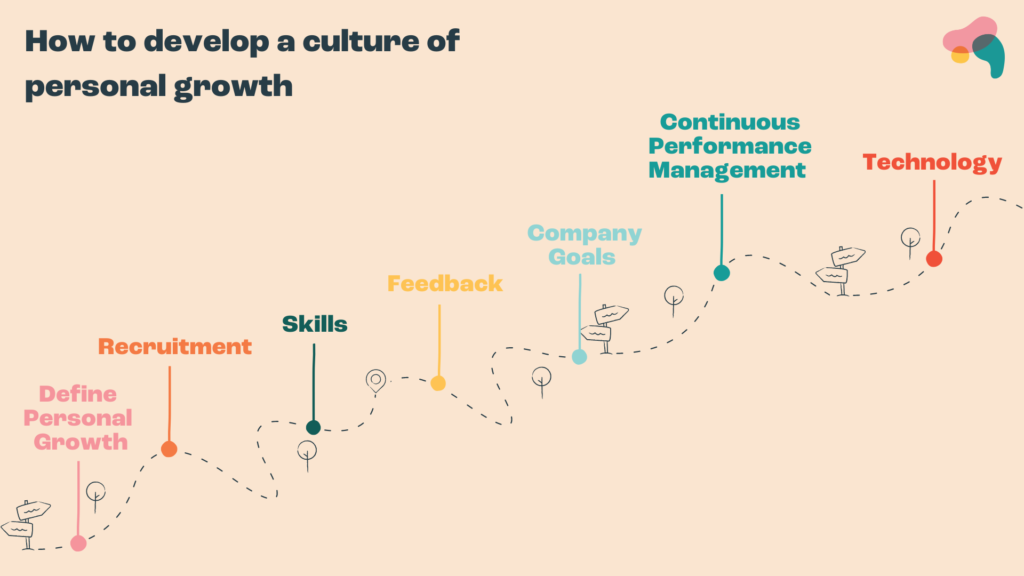
As someone who’s constantly looking for ways to grow and develop, I wanted to share with you the importance of having a culture of personal growth and the necessary steps you can take. Based on my experience and research, I’ve found that companies that prioritise personal growth tend to have happier, more productive employees who are better equipped to adapt to changing circumstances.
1 Define Personal Growth
The first step to creating a culture of growth is to define what personal growth means to your organisation and your people. This involves exercises to understand what personal growth means to individual employees but also what you are ready to promote as a company and in your culture and career pathing: is it becoming an expert? A mentor? Exploring a new function or even just taking a break? Whatever the options you promote, make sure they are clearly identified and communicated.
You can then start promoting concrete solutions as part of your company growth culture such as mapping out skills, providing mentorship opportunities, or promoting a learning system that adds value to both the employee and the company.
2 Recruitment
It can be tempting to focus on the immediate needs of the company – will this candidate fit in right now? But true success lies in a different approach, one that prioritises the potential for growth and development in the future. It’s about adopting a mindset that asks, “How does this person fit into our company in 10 years?” – because when you’re hiring for the long haul, it’s essential to consider not just the present, but also the possibilities of the future.
This is where emotional recruitment comes in. It’s not just about checking boxes on a list of qualifications or experience – it’s about finding someone who embodies the company’s values and has the drive and passion to grow alongside it.
3 Skills
Map out the skills of your employees and compare your current state with your future needs. With this in mind, you take a proactive approach by identifying any gaps in your team’s skill set and taking action to fill them. You understand that a team that constantly learns and evolves is a team that thrives, so you link this process with each employee’s personal growth journey. By doing so, you create a culture of ambition, where every person on your team is motivated to reach their full potential. You recognise that when your people grow, your organisation grows, and the possibilities become limitless.
4 Feedback
Feedback is the topic that is closest to my heart. I truly believe in a culture of continuous feedback, where people receive regular feedback on their performance and behaviour, so they can make the most of their strengths and work on areas for improvement. I strongly believe in two-way feedback where team members can provide feedback to their people leader and vice versa.
5 Company Goals
Create a clear vision for your company’s growth and align it with each team’s goals. Encourage open communication and feedback to ensure everyone is moving in the right direction.
As a concrete and powerful example, I’d like to share what our client Protime has implemented: a powerful framework called the State of the Union (SOTU). Every year each team is invited to spend 2 days offsite to define its goals and align them with the company’s overarching vision. By doing so, every team member is invested in the company’s success, and everyone is moving in the same direction.
6 Continuous Performance Management
Create a culture of continuous improvement by providing regular check-ins between managers and employees to discuss progress, goals, and any challenges that may arise. It’s about creating a supportive coaching relationship that fosters growth and development, so when it comes to feedback, there are no surprises. A culture of transparency and open communication means that everyone knows where they stand and what they need to work on.
Another tip that comes from Protime is to keep a small team structure with regular check-ins to ensure everyone is on track and aligned with the company’s goals. They also have guidelines in place that dictate when teams need to be split to ensure they remain small enough to provide personalised mentorship and feedback.
7 huapii
It’s important to understand that technology is not a magic wand, but an enabler of performance management, feedback, and personal growth. By embracing technology in a thoughtful and intentional way, you can create a more inclusive, collaborative, and growth-oriented work environment for your people.
___
In our latest huapii webinar, I talked with Jonas van Herck, Culture Manager at Protime, about how they implemented each of these steps to grow the company ten to fifteen per cent each year, as well as the people growth which makes it all possible. You can watch it here.
